Related Research Articles

Henry VII, also known as Henry Tudor, was King of England and Lord of Ireland from his seizure of the crown on 22 August 1485 until his death in 1509. He was the first monarch of the House of Tudor.

The House of Tudor was an English and Welsh dynasty that held the throne of England from 1485 to 1603. They descended from the Tudors of Penmynydd, a Welsh noble family, and Catherine of Valois. The Tudor monarchs ruled the Kingdom of England and the Lordship of Ireland for 118 years with five monarchs: Henry VII, Henry VIII, Edward VI, Mary I and Elizabeth I. The Tudors succeeded the House of Plantagenet as rulers of the Kingdom of England, and were succeeded by the Scottish House of Stuart. The first Tudor monarch, Henry VII, descended through his mother from the House of Beaufort, a legitimised branch of the English royal House of Lancaster, a cadet house of the Plantagenets. The Tudor family rose to power and started the Tudor period in the wake of the Wars of the Roses (1455–1487), which left the main House of Lancaster extinct in the male line.

Edward IV was King of England from 4 March 1461 to 3 October 1470, then again from 11 April 1471 until his death in 1483. He was a central figure in the Wars of the Roses, a series of civil wars in England fought between the Yorkist and Lancastrian factions between 1455 and 1487.

Elizabeth Woodville, later known as Dame Elizabeth Grey, was Queen of England from 1 May 1464 until 3 October 1470 and from 11 April 1471 until 9 April 1483 as the wife of King Edward IV. She was a key figure in the Wars of the Roses, a dynastic civil war between the Lancastrian and the Yorkist factions between 1455 and 1487.
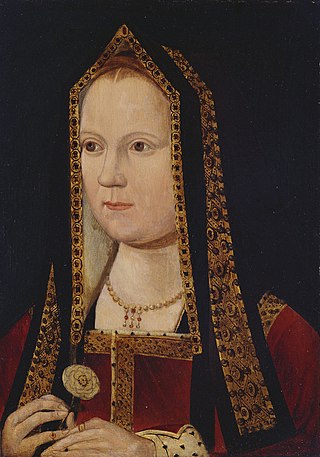
Elizabeth of York was Queen of England from her marriage to King Henry VII on 18 January 1486 until her death in 1503. She was the daughter of King Edward IV and his wife, Elizabeth Woodville, and her marriage to Henry VII followed his victory at the Battle of Bosworth Field, which marked the end of the civil war known as the Wars of the Roses.

Lambert Simnel was a pretender to the throne of England. In 1487, his claim to be Edward Plantagenet, 17th Earl of Warwick, threatened the newly established reign of Henry VII (1485–1509). Simnel became the figurehead of a Yorkist rebellion organised by John de la Pole, Earl of Lincoln. The rebellion was crushed in 1487. Simnel was pardoned because of his tender years, and was thereafter employed by the royal household as a scullion.
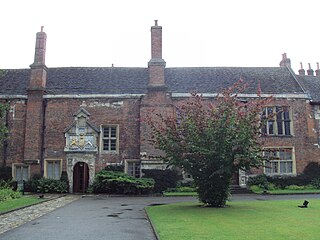
The Council of the North was an administrative body first set up in 1484 by King Richard III of England, to improve access to conciliar justice in Northern England. This built upon steps by King Edward IV of England in delegating authority in the north to Richard, duke of Gloucester, and in establishing the Council of Wales and the Marches.

The Kingdom of England was a sovereign state on the island of Great Britain from the early tenth century, when it was unified from various Anglo-Saxon kingdoms, until 1 May 1707, when it united with Scotland to form the Kingdom of Great Britain, which would later become the United Kingdom. The Kingdom of England was among the most powerful states in Europe during the medieval and early modern periods.

In England and Wales, the Tudor period occurred between 1485 and 1603, including the Elizabethan era during the reign of Elizabeth I (1558–1603). The Tudor period coincides with the dynasty of the House of Tudor in England, which began with the reign of Henry VII. Under the Tudor dynasty, art, architecture, trade, exploration, and commerce flourished. Historian John Guy (1988) argued that "England was economically healthier, more expensive, and more optimistic under the Tudors" than at any time since the Roman occupation.
Edward Thomas Smith is an English author and journalist, former professional cricketer, and cricket commentator. He played first-class cricket for Kent, Middlesex and England, he currently works in association football in the Sporting Intelligence department at Derby County.
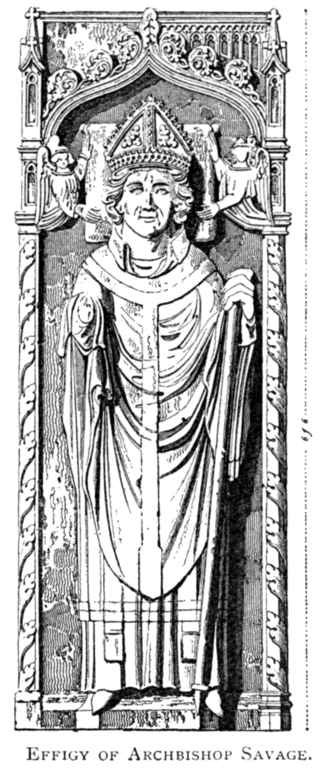
Thomas Savage was a prelate, diplomat and scholar during the Tudor period. Savage served as Chaplain to King Henry VII and was Archbishop of York from 1501 until his death in 1507. Prior to his consecration as a Bishop, Savage served as a diplomat and rector. As a diplomat Savage held the positions of English Ambassador to Castile and Portugal, during which time he helped broker the marriage treaty between Arthur, Prince of Wales and Catherine of Aragon in 1489, and later held the position of English Ambassador to France from 1490, where he took part in the conference at Boulogne.
The Intercursus Magnus was a major and long-lasting commercial treaty signed in February 1496 by King Henry VII of England and Duke Philip IV of Burgundy. Other signatories included the commercial powers of Venice, Florence, the Netherlands, and the Hanseatic League.
Events from the 1480s in England. This decade marks the beginning of the Tudor period.
Events from the 1500s in England.
Cecily Bonville, 7th Baroness Harington, 2nd Baroness Bonville was an English peer, who was also Marchioness of Dorset by her first marriage to Thomas Grey, 1st Marquess of Dorset, and Countess of Wiltshire by her second marriage to Henry Stafford, 1st Earl of Wiltshire.
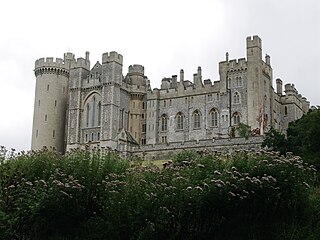
Lady Alice Holland, Countess of Kent, LG, formerly Alice FitzAlan, was an English noblewoman, a daughter of the 10th Earl of Arundel, and the wife of the 2nd Earl of Kent, the half-brother of King Richard II. As the maternal grandmother of Anne de Mortimer, she was an ancestor of kings Edward IV and Richard III, as well as King Henry VII and the Tudor dynasty through her daughter Margaret Holland. She was also the maternal grandmother of Joan Beaufort, Queen of Scots.
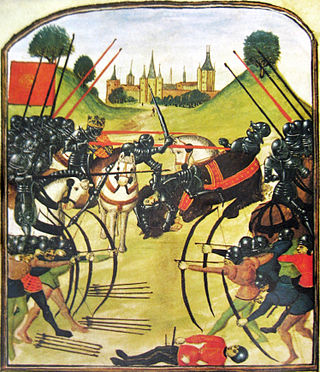
The Wars of the Roses, known at the time and in following centuries as the Civil Wars, were a series of civil wars fought over control of the English throne from 1455 to 1487. The wars were fought between supporters of the House of Lancaster and House of York, two rival cadet branches of the royal House of Plantagenet. The conflict resulted in the end of Lancaster's male line in 1471, leaving the Tudor family to inherit their claim to the throne through the female line. Conflict was largely brought to an end upon the union of the two houses through marriage, creating the Tudor dynasty that would subsequently rule England.
The siege of Boulogne took place during the autumn of 1492. Henry VII of England had led an expeditionary force of 12,000 troops across the Channel to Calais and began to besiege the French port of Boulogne on 18 October. After several weeks the siege was broken off when Henry and the French monarch Charles VIII agreed to the Peace of Étaples. The siege had proved to be a successful show of force and Henry was offered very favourable terms by Charles, including the end of French support to the pretender to the English throne Perkin Warbeck, Warbeck was also expelled from the country. The terms of the treaty also included the English accepting French control of Brittany, and the French paying Henry an indemnity of 742,000 crowns, payable at 50,000 crowns per annum, equivalent to 5% of the crown's annual income. Henry had been in negotiations even before the campaign, and the move against Boulogne may have been intended to put further pressure on Charles.
The Battle of Deal took place on 3 July 1495 in the port town of Deal in Kent when forces of the pretender Perkin Warbeck attempted a landing and were driven off by supporters of the Tudor monarch Henry VII. Warbeck's 1,500 men included many Continental mercenaries hired on his behalf by Margaret of York, while the Tudor fighters were mainly Kentish locals. Fierce fighting took place on the steeply sloping beach. After withdrawing by sea, Warbeck then went to Ireland where he launched an equally unsuccessful Siege of Waterford where two of his ship were sunk and the nine other ships were repelled.

The Authors Cricket Club is a wandering amateur English cricket club founded in 1899 and revived most recently in 2012. Prominent British writers including Arthur Conan Doyle, P. G. Wodehouse, A. A. Milne, E. W. Hornung and J. M. Barrie have been featured as players on the club team, the Authors XI.
References
- ↑ "Thomas Penn". Simon and Schuster. Retrieved 16 April 2019.
- ↑ Authors Cricket Club (2013). The Authors XI: A Season of English Cricket from Hackney to Hambledon. London: Bloomsbury. ISBN 978-1-4088-4045-0.
- ↑ Castor, Helen (22 September 2011). "Winter King by Thomas Penn: Review". The Telegraph. Retrieved 22 April 2019.
- ↑ Worden, Blair (25 November 2011). "Winter King: the Dawn of Tudor England by Thomas Penn--Review". The Guardian. Retrieved 16 April 2019.
- ↑ Williams, Charlotte (14 November 2012). "Tomalin, Penn win Biographers' Club Prizes". Bookseller.com. Retrieved 22 April 2019.
- ↑ Hollingshead, Iain (30 May 2013). "Henry VII: Winter King, BBC Two, review". Telegraph. Retrieved 7 May 2019.
- ↑ "The Brothers York: An English Tragedy". Goodreads. Retrieved 18 April 2019.
- ↑ "Edward V (Penguin Monarchs): The May King". Goodreads. Retrieved 18 April 2019.
- ↑ Penn, Thomas (30 December 2014). "England Arise by Juliet Barker review – 14th century discontent". The Guardian. Retrieved 18 April 2019.
- ↑ Penn, Thomas (30 October 2013). "The King's Grave: The Search for Richard III by Philippa Langley and Michael Jones - review". The Guardian. Retrieved 18 April 2019.
- ↑ Penn, Thomas (19 October 2012). "Hilary Mantel's Thomas Cromwell is the man for this season". The Guardian. Retrieved 18 April 2019.
- ↑ Penn, Thomas (27 July 2017). "False Brought Up of Nought". London Review of Books. Retrieved 19 April 2019.
- ↑ Penn, Thomas (17 July 2014). "Jousting for Peace". London Review of Books. Retrieved 19 April 2019.
- ↑ Penn, Thomas (5 April 2012). "The First Consort". London Review of Books. Retrieved 19 April 2019.